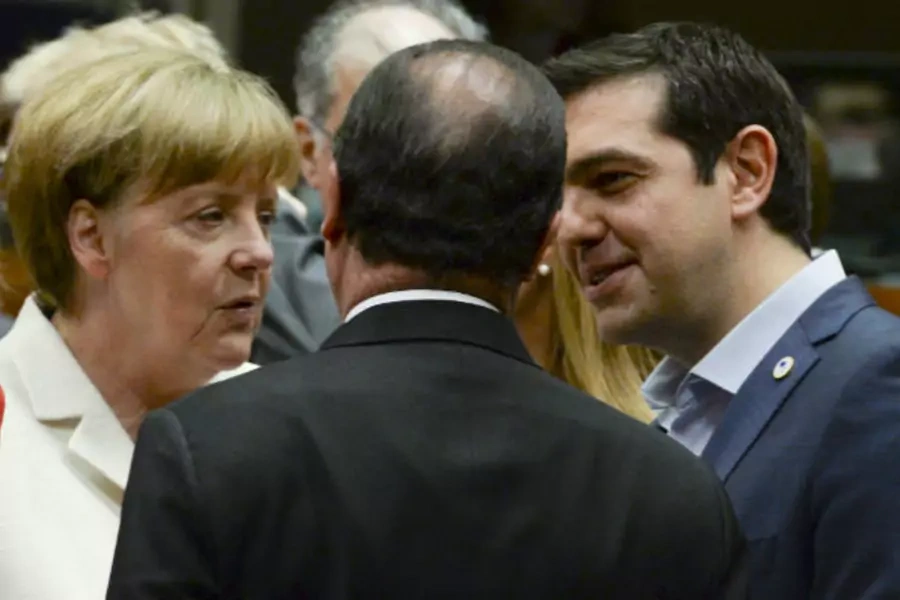More on:
European leaders, meeting tonight in Brussels, appear to have given Greece something close to a take-it-or-leave-it offer. If the Greek government can pass far-reaching reforms by Wednesday, creditors will provide bridge financing to meet near-term debt payments and cash to reopen the banks. These steps also would allow a rebuilding of trust and allow negotiations on a third bailout that could total €86 billion to proceed.
It is unclear as of now whether the Greek government will take this deal, or end negotiations knowing that a failure tonight could signal Greece’s exit from the eurozone. Even if Prime Minister Tsipras does agree to these measures, the risk of failure is high, and deteriorating economic and financial conditions will further stress the government. Already there are reports of significant fissures within the ruling Syriza party, which could result in a political realignment (and possibly an unaffordable delay) if the government is forced to rely on substantial opposition support to pass these measures. At this stage, it is hard to have much confidence that this route will lead to a Greece that is competitive and growing sustainably within the eurozone.
What creditors are offering
The proposal, as reported by various news agencies, requires the Greek government to pass a broad range of reforms by Wednesday, July 15. These include: substantial VAT and pension reforms; a new code of civil procedure as part of judicial overhaul; full implementation of past EU laws, including procedures for automatic fiscal cuts when targets are not met; and, implementation of bank recovery and resolution directive as first step towards fixing the banks. Many of these proposals had been floated in earlier rounds of negotiations, but the requirement that they all be passed by Wednesday is daunting.
Conditional on above, negotiations will be launched on a third bailout package and would include further reforms including: (i) Eliminating the pension deficit (that now stands at 10 percent of GDP); (ii) Adoption of ambitious product market reforms; (iii) Privatization of the electricity transmission network (ADMIE); (iv) A comprehensive labor market review including collective bargaining, industrial action and collective dismissals and a commitment to European best practice; (v) Large-scale privatization, including the possibility that €50 billion of assets would be turned over to an EU-controlled facility; and (vi) Broad-based administrative reform.
The financing program would be between €82 and €86 billion. Most of the funding would come from the European rescue facility (ESM), but IMF monitoring and financing is a precondition for a new ESM arrangement. Financial support would include a near-term bridge of around €7 billion by July 20 and another €5 billion by mid-August that would allow it to meet upcoming debt payments and clear arrears with the IMF, but fiscal support for the reactivation of the economy would appear to wait for the approval of the larger program later this summer. I assume that a possibly significant expansion of emergency liquidity (ELA) by the ECB would be part of the package.
There is no explicit commitment to debt relief in the proposal, meeting German concerns about setting new precedent but denying Greece political cover that they had sought for the reform package. Longer grace and repayment periods would be considered conditional on full implementation of measures and after a positive first review of a new program, so around end year.
Finally, there has been discussion that Greece would take a "time out" from the eurozone if a deal can’t be agreed, with the promise of a return at some future date. This is clearly provocative and probably not essential to a deal.
Ambitious but likely to fail
This is an extraordinary ambitious package, and includes an intrusive continuing role for the Troika (IMF, ECB, and EU). Further, as difficult as passage of the July 15th measures will be, the requirements for a third bailout looks to be an even more substantial ask of the Greek government, which raises the prospect that the stage one agreement is a bridge to another confrontation and crisis.
As I mentioned earlier today, the massive financing need is a problem. There are hints in the document that that financing could fall short, which would then require additional fiscal adjustment or privatization measures. (Greece has already strongly objected to turning over privatization assets to a EU-controlled institution.) It also is unclear whether a buffer fund of €10-25 billion for recapitalization and resolution costs is included in the gap or additional, but in either case the banking costs are substantial and growing by the day.
The IMF cannot be thrilled by the proposal. The IMF has been wary about committing financing to a package that doesn’t have debt relief, which is not explicit here, and should worry that they will be asked to pick up the residual if financing falls short. Their exposure is already high and exceptional access would be difficult to justify in these conditions under their rules. Meanwhile, the Greeks would far prefer to not have a new IMF arrangement. Both sides look like they will be disappointed on this point.
In sum, a very tough and risky choice for Greece. Negotiations are continuing, but aside from some hot button issues (e.g., privatization) and some smaller issues on the margins, there would appear to be little appetite for additional concessions from creditors. We should learn soon which direction Greece will take.
More on:
 Online Store
Online Store
